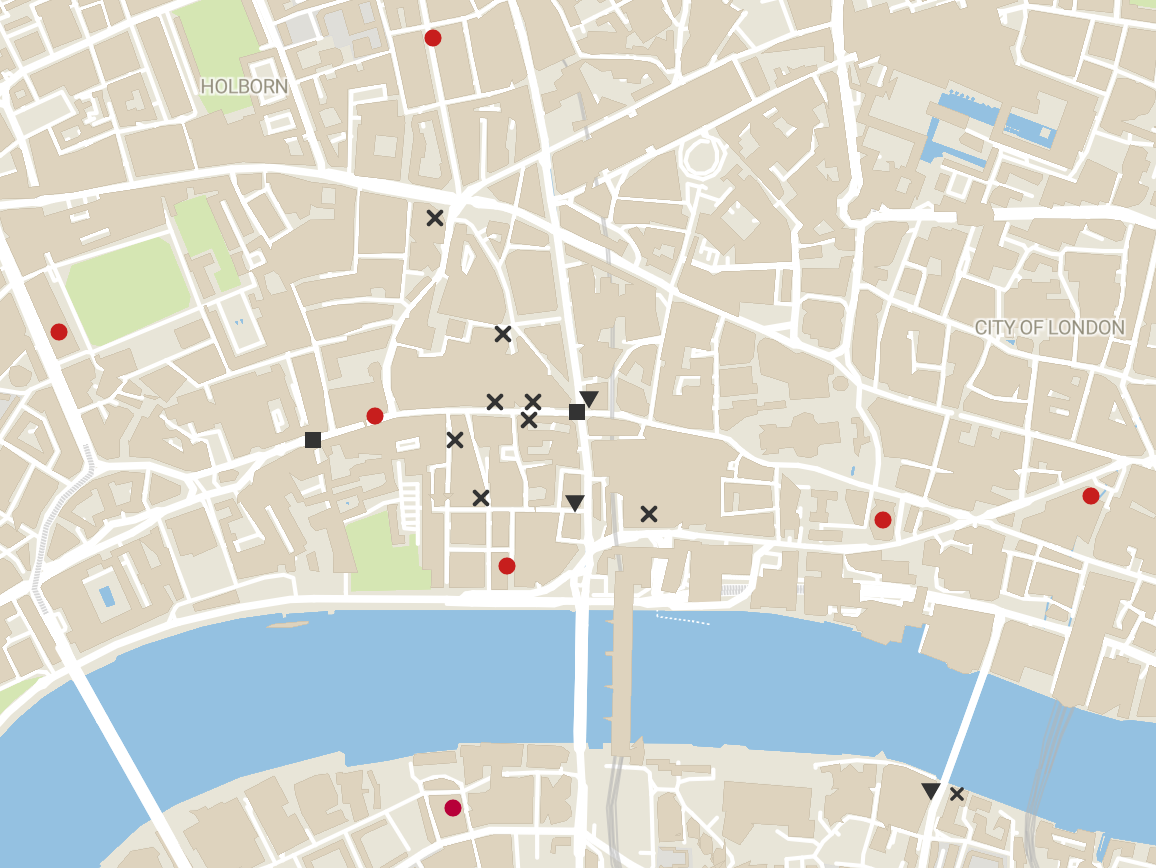
Fleet Street: once home to the highest-circulation newspapers in the world, it now boasts a variety of fast lunch options and a Snappy Snaps.
By this stage it’s as much a cliché to point out “Fleet Street” in the old sense no longer exists as it is to invoke the term earnestly. Rupert Murdoch began breaking up the old village almost four decades ago, when he switched News International’s operations from Bouverie Street to a modern facility in Wapping in 1986 as part of a bid to free himself from having to bargain with the print unions.
But long after Murdoch led much of the press out of its historic home, few have gone very far and the UK media remains concentrated in London.
We have mapped out what the London media scene looks like nowadays below. First, some provisos: these mnaps inevitably leave some organisations out. If you think yours or another outlet has been unjustly passed over, let us know by emailing bron.maher@pressgazette.co.uk.
Second: these maps are based on public information. We’ve tried where possible to verify that an office is an actual office rather than, for example, a virtual address for Companies House’s benefit. And online information about the former Fleet Street addresses of some news organisations is scant, so we haven’t captured them all.
Finally, owing to various media mergers and closures over the past few decades, a map that simply showed where the old Fleet Street-based national newspapers are now would have approximately six dots on it. Fleet Street is a metonym for the UK news media as a whole, and a map containing more information is more interesting – as such, we’ve included broadcasters, local publishers, digital media and magazines.
So with that done: where did everyone go?
The only publisher Press Gazette found that still operates a premises on Fleet Street itself is DC Thomson (despite having its headquarters in Dundee). Journalists no longer work at the office, but the building remains an excellent standard bearer, emblazoned in red with the names of several of its Scotland-based titles, and continues to house non-editorial staff.
GlobalData (a sister company to Press Gazette's parent, the New Statesman Media Group) is the next closest news publisher, working out of John Carpenter House opposite the old Daily Mail offices. Besides DC Thomson, it's also the only office to have a Fleet Street postcode (EC4A and EC4Y).
Closer still to the street itself are regulators IPSO and Impress - neither of which existed when Fleet Street was still a functioning media hub, but nonetheless stand ritual guard off its eastern end.
There is a cluster of publishers loosely centred around Cannon Street, with business publications the Financial Times, Bloomberg and City AM distributed across a kilometre span within the Square Mile. (An aside: next time you're walking by the FT's home at Bracken House, take a closer look at the astrological clock over its front door. That's not the face of an anonymous cherub you see at the centre - it's Winston Churchill.)
Across the river News UK's The News Building, aka the "Baby Shard", houses Rupert Murdoch's titles, while the actual Shard provides Al Jazeera with its London offices. Huffpost UK sits next door on Tooley Street. All those publishers sit within one postcode, SE1.
To the north-east, Vice has been joined in Shoreditch by fellow digital publisher Insider as well as the London bureau of CNN. Nearby, Evgeny Lebedev's Independent and Evening Standard upped sticks just last month from High Street Kensington to the Moorgate area. And while Ladbible's headquarters are in Manchester, its London offices are down the road in Aldgate, at the (briefly fire-afflicted this year) Relay Building.
Soho and Covent Garden provide a berth for a jumble of outlets: Private Eye are neighbours to Money Saving Expert and Tortoise Media, and a ten minute walk from the London offices of The New York Times. Hearst and Global flank Leicester Square.
Things are more spread out to the west, where DMGT's Northcliffe House shelters Lord Rothermere's many titles (and until last month The Independent and Evening Standard, too). The Barclay-owned Daily Telegraph and Spectator are relative neighbours in Victoria and Westminster respectively, but remain a 20-minute stroll apart. A number of outlets have a Westminster presence, although few as their main office.
Another cluster, in Paddington, sees various Future-owned magazines share a Pret or two with staff from PA and GB News.
Off east, Reach's tabloids occupy one floor in the UK's one-time tallest building, One Canada Square. They are across the road from Reuters at Five Canada Square, where the agency relocated after becoming the last publisher to move headquarters from Fleet Street.
The Guardian and Observer are relatively secluded, perched up on north of King's Cross by the Regent's Canal. But they're not as secluded as this map's most northerly publisher, the Associated Press (which has recently opened its doors to share with Kamal Ahmed's start-up The News Movement). Their office, a mile or so along the canal from Guardian towers, also holds the distinction of being slap in the middle of Camden's Stables Market.
The media may have followed Murdoch out of Fleet Street, but they wouldn't follow him to Isleworth. Sky News remains a lonely presence out in Zone 4, with the only similarly distant London publisher on this map being the Morning Star down in Croydon's trade union hub Ruskin House.
Looking at the maps it becomes clear that, post-Fleet Street, few news publishers have gone particularly far away. The London media is still mostly in Central London, and arguably around Fleet Street, even. Wherever you are now, El Vino and Snappy Snaps are just a train ride away.
Related Article: What reporters can learn from a Fleet Street legend who challenged a famous explorer’s North Pole claim
Email pged@pressgazette.co.uk to point out mistakes, provide story tips or send in a letter for publication on our "Letters Page" blog
